The 2020 Virtual Michigan Annual Conference took place on screens across the state on July 26-28. Bishop David Bard presided from a studio in Lansing. The essential mission was accomplished.
KAY DEMOSS
Senior Content Editor
July 28, 2020 | LANSING – The word “monitor’ took on a whole new meaning for The Michigan Annual Conference in 2020. In the past, the term referred to a panel of persons observing conference action and reporting levels of participation. In 2020 it described the dozens of screens of all sizes used by producers, leaders, and viewers to engage in holy conferencing together.
In fact, the Commission on the Annual Conference, chaired by Nichea VerVeer Guy, planned three annual conferences since the 2019 session adjourned. The first six months focused on a traditional session to be held again at Grand Traverse Resort in Acme, May 28-31. Next came the weeks of organizing a Special Session of Annual Conference. Members gathering at Albion First United Methodist Church on March 7, advanced a petition “Reconciling and Grace through Separation and Restructuring” to the fast-approaching 2020 General Conference.
Plans turn-around
Then came coronavirus. Annual Conference and General Conference sessions scheduled for May 2020, were postponed. For these last four months, the Commission pivoted from working their plan for an in-person conference to creating an altogether different plan for a virtual session.
How do you “do” an annual conference measured in square miles rather than square feet? Such a turn-around involved a change of agenda and procedure to focus on the “essentials” of what an annual conference does. Informing and equipping members to engage with that essential work was set in motion, involved old-tech like the US Postal service and telephones, and new-tech like ZOOM. Conference leaders, accustomed to standing before a microphone on a stage in real-time, were coached on what was needed for online reporting and decision-making. Times for recording, rehearsal, and training were added to the calendar. A monumental effort indeed. Then there was careful masking and social distancing during on-site gatherings just to add to the complexity.
Memory affords a view of what the traditional 2020 Annual Conference would have looked like. This is a closer-up image of the 2020 Virtual AC that filled members’ monitors during down-times in the agenda.
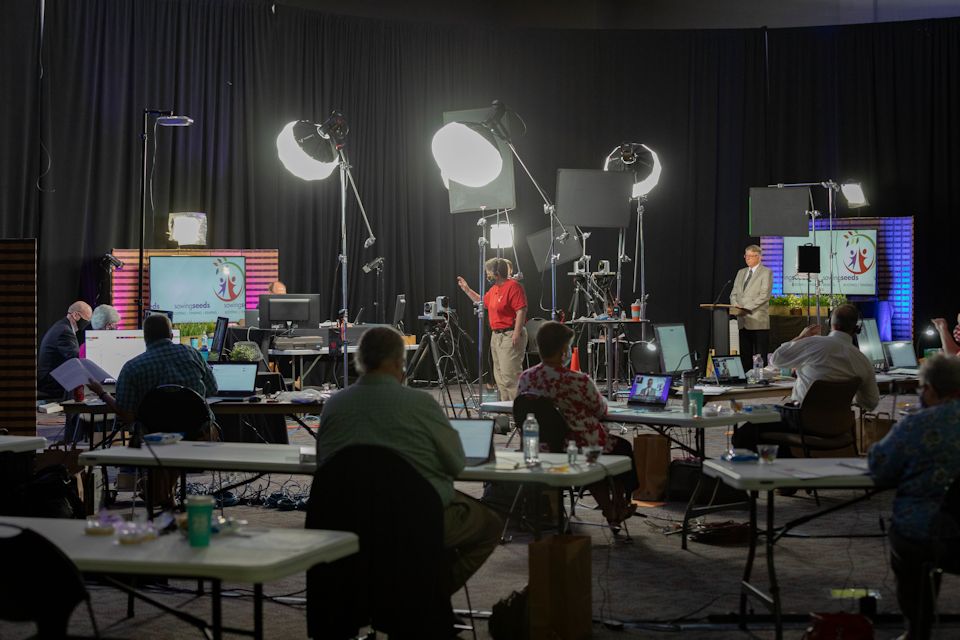
A typical annual conference agenda includes around 27 hours of reporting, legislating, and celebrating. The printed program for the virtual conference was pared to 11 hours. With early adjournment both of Monday’s plenary and Tuesday’s Clergy Session, the total face time of interaction was 9 hours.
Todd Price, Chairperson of the Rules Committee of The Michigan Conference, spoke to the framing of the agenda. “Our agenda has been prepared in accordance with ¶605.2 by the Commission on the Annual Conference Session in consultation with the bishop, district superintendents, and conference lay leaders,” he noted in the guidebook mailed to all members. “The agenda provides for addressing items necessary for the ongoing functioning of our conference, or our conference plan of organization and rules of procedure first, and only addressing other business as time permits.” Price added, “I am deeply grateful that so many persons were willing to withdraw their resolutions in the interest of facilitating our work in meeting virtually.” Fifteen of 23 resolutions were so withdrawn.
During opening moments of the Monday session, Bishop David Bard echoed Price’s statement, expressing gratitude for this cooperation. Bard said, “While meeting virtually works well for many things, it is not particularly helpful for robust conversation., particularly about topics where there are important differences of opinion.” He thanked authors of resolutions for their “kind and generous spirits and your selflessness” in withdrawing those items that went beyond the essentials.
OPENING WORSHIP | July 26
Though the schedule was significantly shortened, the 2020 Virtual Michigan Annual Conference followed the original theme and focus: “Sowing Seeds: Rooting, Tending, Reaping.” Opening Worship was celebrated on Sunday evening, July 26. The Rev. Dr. Margie Crawford, superintendent of the Midwest District, served as liturgist. Her first words, “Apart, yet together,” well described the extraordinary nature of the virtual experience. The tradition hymn, “And Are We Yet Alive?” was especially poignant at a time when over 6,200 Michigan residents had died of coronavirus.
Other hymns, the Service of Remembrance, and the sermon all followed the agrarian theme of the conference. Crawford introduced the roll call of saints by saying, “They planted seeds within us … they nurtured our faith and helped us grow closer to you. Through them you cultivate our sense of call and purpose so that we would sow your love and serve your people.”
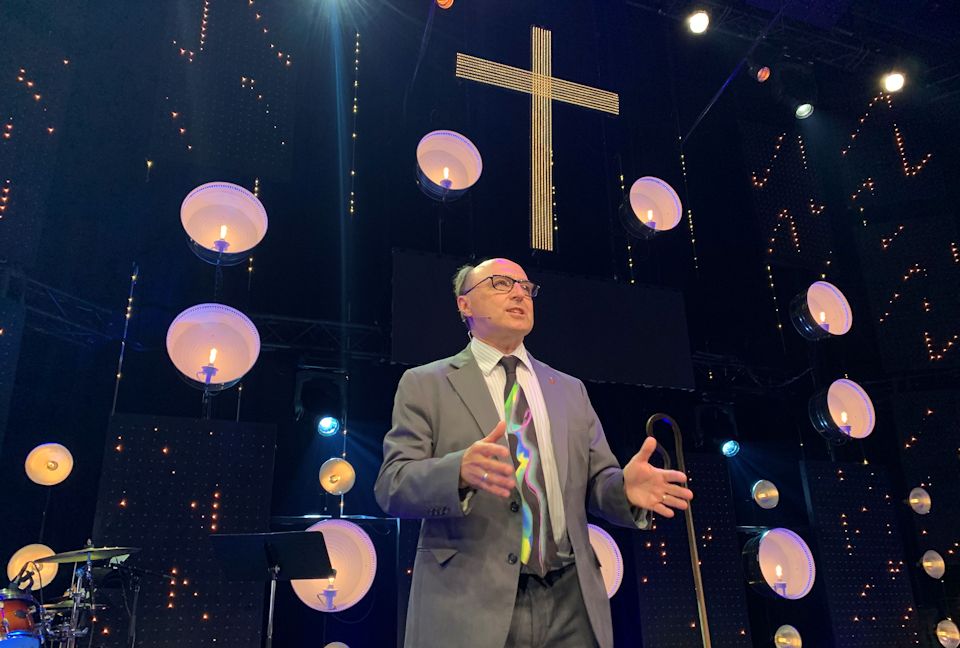
The Parable of the Sower provided the scripture foundation for Bishop David Bard’s sermon, “Dancing in a Mine Field.” Last fall, his original inspiration for the sermon was the game Minesweeper. “I thought I would be preaching … a couple of weeks following General Conference. I would have been preaching about mine fields of potential division within the denomination,” he began. Bard then noted that new mines had been laid since. “Wow. Has the coronavirus laid mines and changed the landscape … The brutal killing of George Floyd at the hands of Minneapolis police has seared our consciences. It has brought to the fore deep racial divides and exposed painful wounds … There is no question that we need to grapple with racism in our conference and our churches.”
With a firm focus on grace for all, the preacher spoke of “soil time” and “seed time” that produce congregational vibrancy, community outreach, and social justice. “Prepare good soil,” the bishop urged, even in the context of, “an ongoing pandemic, ongoing divisions about human sexuality and likely division in The UMC, and tough work of anti-bias and anti-racism.” Virtually dancing at the podium, Bard cited scripture and poetry. “Picture the sower in the joy of the work, feet moving rhythmically, dancing about the field to sow seeds … Our task from Jesus is clear. Keep sowing seeds. Keep dancing the dance. Keep your hand on the plow! Hold on!”
Click here for a full account of Opening Worship.
MORNING PLENARY | July 27
The Rev. Brad Kalajainen, lead pastor of Cornerstone Church, picked up the “Sowing Seeds” metaphor during opening devotions on Monday morning, July 27. Kalajainen described six seeds “that will bear fruit if planted, nurtured, and tended over time.” He invited viewers “to pursue them relentlessly.” Read Pastor Kalajainen’s full remarks about seeds labeled conversational, invitational, relational, glocal, digital, and foundational.
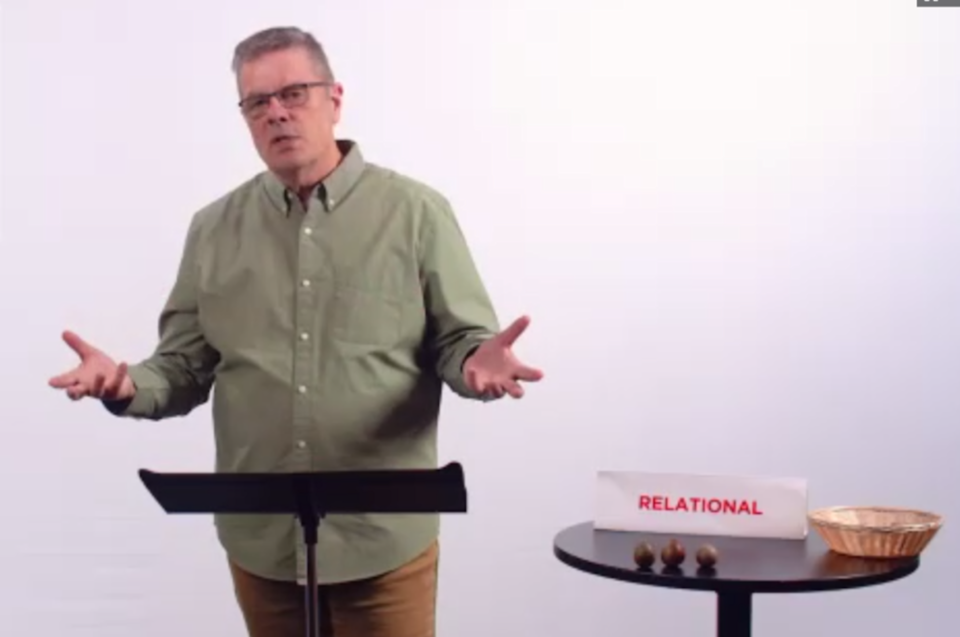
Nichea VerVeer Guy opened the session celebrating, “the diverse pathways and legacies of the people of The Michigan Conference.” She honored First Peoples of the area for “caring for this abundant place … The harvest of these Great Lakes and their fertile lands would go on to nourish expanding cultures.” The review of the state’s history included a call for justice in the present. “The slaves that found freedom in this place stood firm for their rights even when they were beaten and treat unjustly … To all of our siblings, we apologize for the past atrocities that were inflicted upon you out of racism and doctrinal abuse. At this time, when we come together as Michigan United Methodists, we humbly ask forgiveness. We honor you.” Click here for her full statement.
Health and Benefits
Work on the essentials then began with a report by Director of Benefits and Human Resources Don Emmert, along with a series of annual benefits-related resolutions. He reminded local churches that the Benefits Ministry Shares Holiday, instituted in April for financial relief during the pandemic, ends September 30, 2020. “Simply remember two words, Line 27. That’s the amount that has not been billed since April, but that will resume in October,” he stressed. He also noted that the holiday was made possible by those liabilities being funded through reserves in the amount of $1.9 million. “No persons, churches, contributions, or programs were harmed in the making of this holiday,” Emmert said. “Furthermore, there will be no increase to any Benefit Ministry Shares percentage rates in 2021.” He added that “for the second year in a row, the Conference Board of Pensions and Health Benefits is at work to assure no health insurance premium increases next year.” He concluded, “I trust this report has been boring and quick enough for most.”
Important note. The voting on all resolutions before the annual conference on Monday was done by paper ballot. Those ballots will be tabulated over the next weeks, and vote counts will be announced by Bishop Bard by Labor Day weekend. Therefore, the legislation mentioned in this overview, are resolutions presented and voted upon by those marking ballots during the virtual session; the results of those votes remain unknown at the time of this report. All resolutions except one – R#2020-23 — were voted on without amendment. Line 10 of R#2020-23 was amended by striking “the Vital Church Initiative (VCI) or a Paragraph 213 Review” and replacing with “Roads to Vibrancy or Local Church Assessment.” See the Legislative Guide for details of all resolutions.
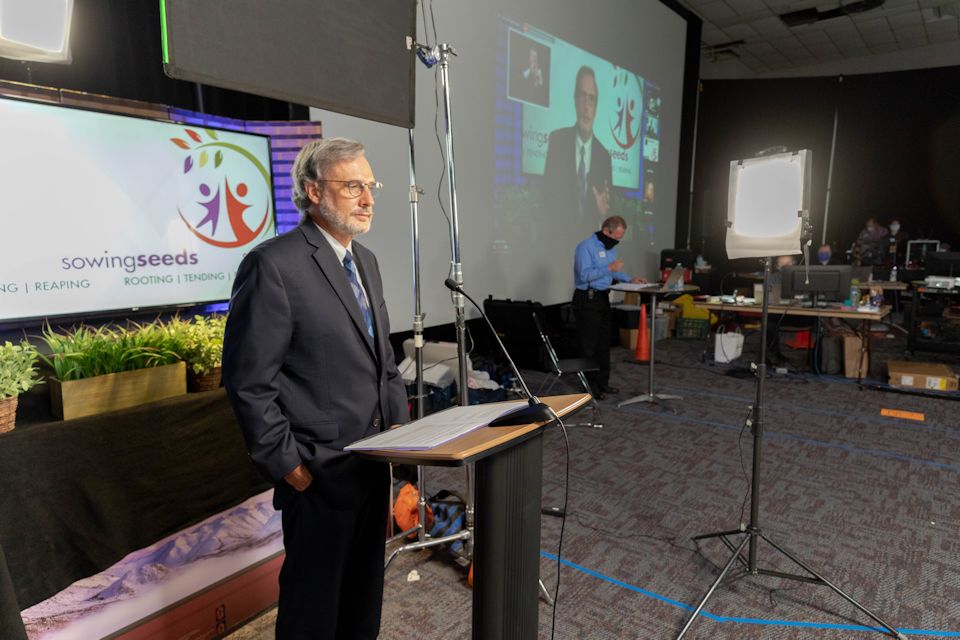
Pension and Benefits resolutions addressed: Authorization to address claims; Housing/Rental Allowance; Comprehensive Benefit Funding Plan; Past Service Rate; and Equitable Compensation.
Plan of Organization
The Bishop recognized Amy Mayo-Moyle, chair of the Conference Leadership Council (CLC), Brad Bartelmay, chair of the Conference Council on Finance and Administration (CFA), and Jim LeBaron, chair of the Conference Trustees, to present resolutions on the Plan of Organization. The three resolutions seek to add persons to those bodies.
Finance report
Bartelmay was called upon to share the report of CFA. He began, “There is no way to soft-peddle the financial challenges we are facing.” He then went on to describe the central challenge around the remittance of Ministry Shares. “Payment of Ministry Shares is weakening each year.” In 2018 $11.4 million was by churches for ministries of the conference and general church. That number dropped by $800,000 in 2019. Further dramatic decline has happened during the COVID-19 outbreak. Bartelmay said, “At the end of May, payment of Ministry Shares is 23.1% behind where it was on the same date last year.” He added that a Paycheck Protection Loan received by the conference “will not be sufficient to address the deficiency.” The 2020 Conference, first reduced by 15%, now “has grown to 30% in many areas.”
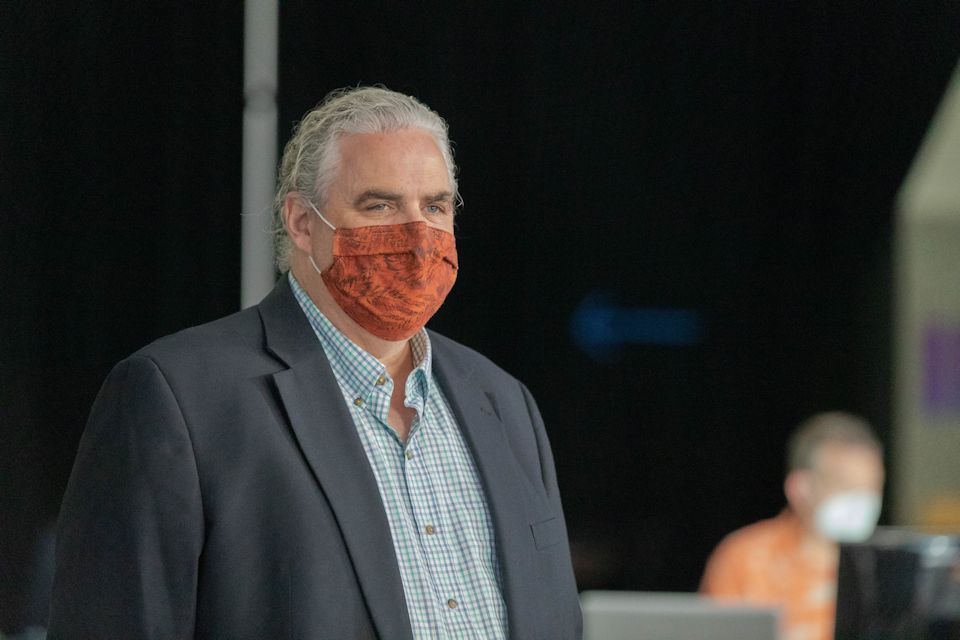
The CFA chair explained that in 2019 only 59% of Michigan churches paid their Ministry Shares in full. Such chronic deficiency in payment “is simply not just,” he stated. Bartelmay said CFA is forming a task force and outlined anticipated study and strategies coming in the future. “Absent a renewed commitment to Ministry Shares, the conference will need to take dramatic steps which will fundamentally alter and contract the way we do ministry,” Bartelmay cautioned.
Read a more detailed account of the CFA report here. Watch Brad Bartelmay give the report in the Video of Day 2 Morning Session, starting at 1:49:52.
Nominations
Janet Larner moved acceptance of the Nominations Report. Click here for a pdf copy. Janet retires this year, both as pastor and chair of the committee. She announced that Melissa Claxton is the new chair and that Nominations welcomes contact from those interested in serving.
AFTERNOON PLENARY | July 27
Report by Lay Leaders
John Wharton and Anne Soles shared perspectives as they leave their role as co-leaders of Michigan Conference laity. Wharton praised the vital role of laity-clergy partnership. “Even the early disciples knew the importance of increasing the number of people performing ministry,” he said, quoting Acts 6:1-14. Turning to Paul’s words in 1 Corinthians, Wharton encouraged members and viewers to learn more about their spiritual gifts. He recommended Lay Servant Ministry programs and a book, “Your Spiritual Gifts Inventory,” by Charles Bryant as resources.
Anne Soles picked up the report with the statement, “The church when you get down to it, is 98% laity!” She talked about John Wesley General Rules about private acts of mercy and public acts of justice. “Each disciple is called to action. It might be sharing a conversation. It might be sharing a chainsaw,” she noted. Soles encouraged laity to follow the model of Jesus. “He didn’t send a mass mailing or tweet” but relied on one-on-one connections. Her advice to all laypersons was, “Keep your tool kit with you.” Click here for a more detailed account of the report by the lay leaders, including a link to their remarks.
Corporate Session
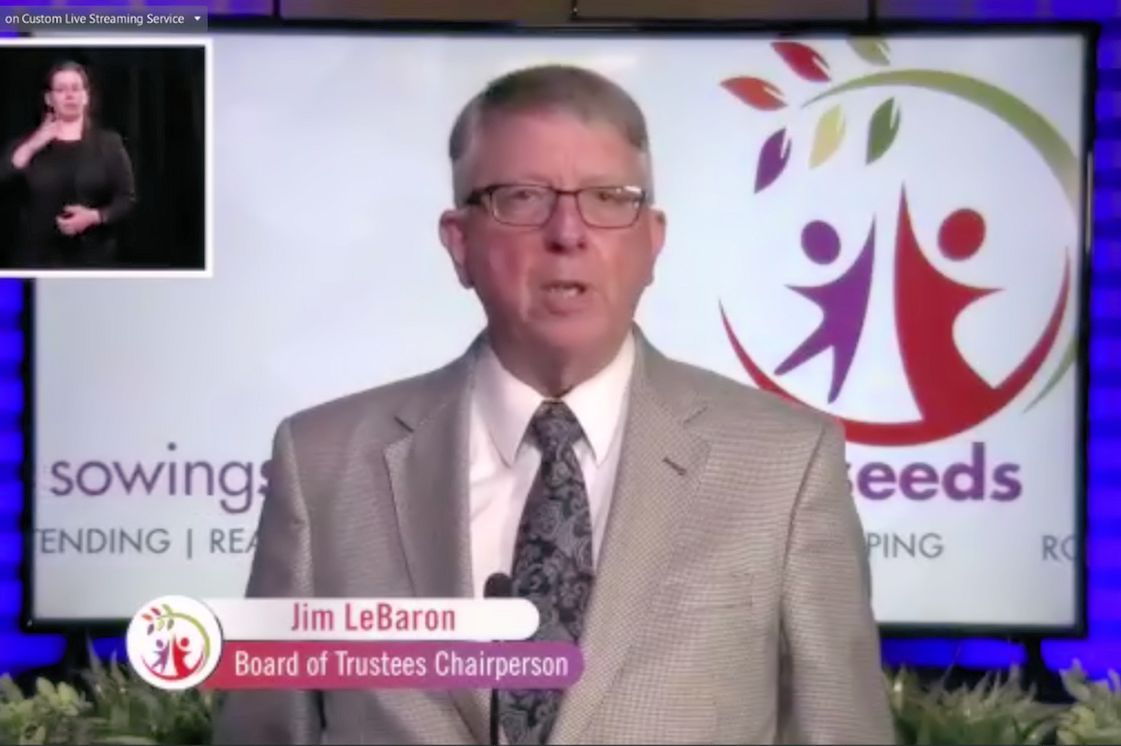
Jim LeBaron began the report of the Michigan Conference Trustees with an overview of what was to come. First, a work summary that outlined their work on policies and procedures, a tax issue, sale of property, archive storage, and annual insurance review with Church Mutual. LeBaron gave particular emphasis to the transfer of title of the Saganing Indian Church to the Saginaw Chippewa Tribe. “We asked Bishop Bard to be the one who executed the deed on their behalf,” he noted. “And that is something that is a real accomplishment in terms of what we’ve done.”
Secondly, the chair spoke of the growing relationship between the trustees and board of Michigan Area United Methodist Camping regarding the disposition of properties. He turned to Stuart Smith, board chair, for a report. Smith explained the challenges that drove the sale or shuttering of conference camps over the past 18 months. He reviewed the strategic plan recently adopted by the board that focuses on a faith formation model at three sites: Lake Huron Retreat Center, Lake Michigan Camp & Retreat Center, and Wesley Woods Camp & Retreat Center. “We appreciate the sadness and disappointment these changes cause,” Smith said. “The closing of any camp is not taken lightly and is not to detract from the great ministries and wonderful experiences enjoyed by campers over the years.” He expressed excitement about the future growth of a life-changing camping ministry. “COVID-19 and the subsequent loss of revenue this spring and summer,” Smith said, “adds a layer of challenge but does not weaken our determination or enthusiasm for the future.” Click here for more in, “Camping sets a new course.”
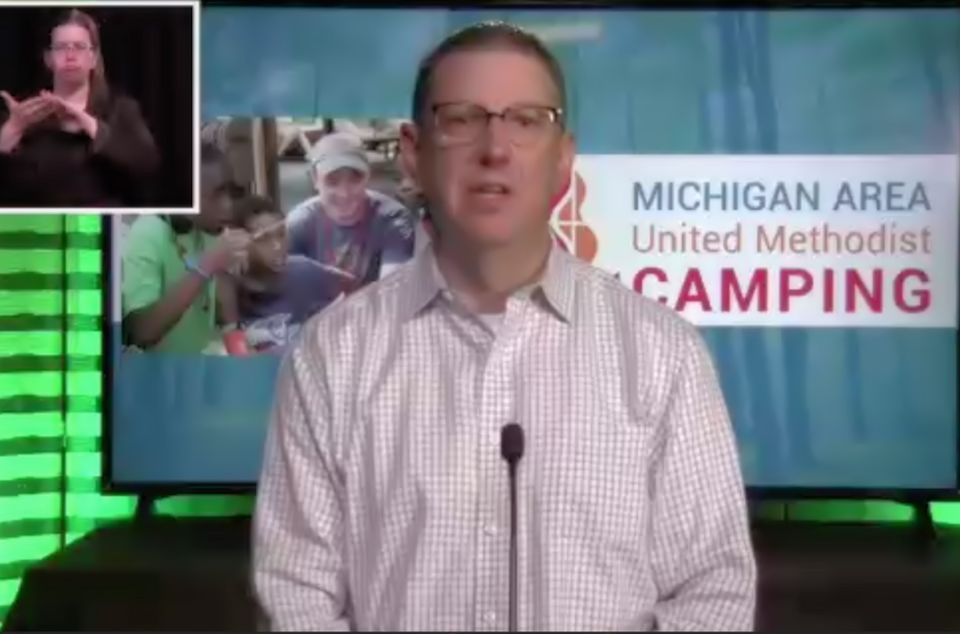
View the video of the entire corporate session in Day 2 Afternoon Session, starting at 20:50.
LeBaron’s third of six elements was mention of Dowry Reports. The 2019 Annual Conference approved a minimum of $250,000 for each of the nine districts of The Michigan Conference. Districts were to “utilize their Board of Missions and apply those monies in missional support and extended grants.” Time did not allow these reports to be made. But they will be printed in the 2020 Conference Journal and made available in MIconnect. “It’s really good news,” LeBaron stated.
Elizabeth Hill, dean of the Appointive Cabinet, was called on to share the fourth item of Corporate Session business. She read the legacy reports of four churches whose closure was voted on at this session. These include:
- Owosso: Burton UMC (closing date June 30, 2019) “reached a significant pinnacle in the late 1970s, with a youth ministry reaching over 70 area youth each week.”
- Ubly UMC (closing September 30, 2019) “The Ubly church was a community leader in VBS for over 50 years.”
- Muskegon: Unity UMC (closing December 31, 2019) “In the hope that their heart for missions will live on, the final action of the church was a ‘Legacy Donation’ to the ministry of Mission for Area People.”
- Mulliken UMC (closing March 1, 2020) “Mulliken, even at the end of its journey, still housed the food pantry ministry for the wider village and rural community, and was seen as the community center.”
The fifth element of the session was the presentation of three Michigan congregations for disaffiliation with The United Methodist Church. LeBaron explained, “Bishop Bard has said, ‘I will honor the work that the trustees have done on this,’ and what we have done is modify the process [¶2553 under review by Judicial Council] and call it withdrawal.” The three churches brought to the annual conference for vote to affirm their withdrawal are: Shabbona UMC, East Boardman UMC, and North Adams UMC.
With prayers for the seven congregations, Bishop Bard presided over questions and the voting on closures and withdrawals.
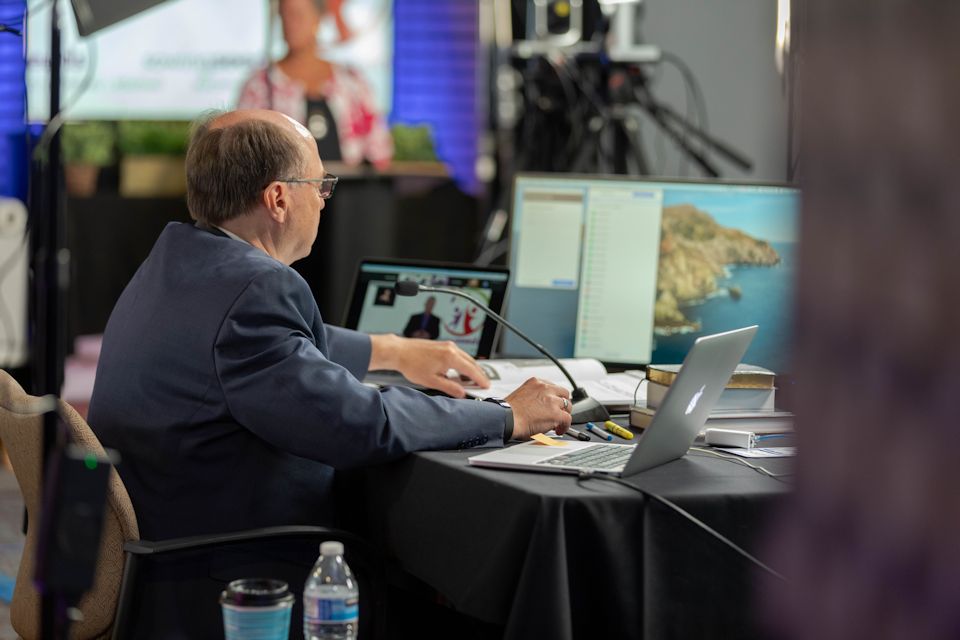
2021 Conference Budget
Monday afternoon Bartelmay returned to the microphone to present the 2021 conference budget. He shared highlights:
- $12,617,521 total budget is a 14.7% decrease from 2020;
- all cost of living increases eliminated; full-time receptionist and half-time Board of Ministry staff eliminated; Youth Coordinator now half-time;
- added expenses of Disaster Response Coordinator (previously paid by UMCOR) and Coordinator of Hispanic/Latino Ministries (previously paid in part by General Board of Global Ministries);
- Benefits Ministry Shares not decreased in 2021 (as reduced in 2020 by $1.86 million through the BMS payment holiday);
- 25% increase in the Equitable Compensation Committee (reflects the escalating number of appointments that need to be adjusted as the conference continues to contract).
With no questions asked, members approved the 2021 Budget of The Michigan Conference as presented. Find details on pages 20-21 of the Legislative Program Guide.
Bishop Bard spoke words of encouragement. “We do believe that by the grace of God and the power of God’s Spirit, we can respond to the challenges we face as a church. Decline is not inevitable.”
Report by Dean of Cabinet
The Rev. Elizabeth Hill, outgoing superintendent of the Heritage District, has served as the dean of the Appointive Cabinet since the close of the 2019 Annual Conference. “What a year it has turned out to be!” She spoke of the first nine months that ensued. “We left the 2019 Michigan Annual Conference with mixed emotions regarding the actions of the conference and the uncertainty of the next General Conference around issues of inclusivity of the LGBTQI community.”
After a winter full of “promise and hope” with Local Church Assessment underway, coronavirus changed the ministry landscape dramatically. “Through hard work and the grace of God, the church did not close!” Hill exclaimed. “It was amazing to see how creative the churches became,” she observed. Turning her attention to recent developments in the streets of America’s cities, Hill said, “Through George Floyd’s death, we are reawakened to the racism that exists in our nation.” Noting that there is still much to be done to dismantle racism, she asserted, “The work of being an anti-racist white person needs to be active in the life of our churches.” (Click here for the text of Elizabeth Hill’s full report.)
Recognitions
United Methodists across The Michigan Conference join Bishop David Bard in saying, “One of the things I really miss about not being together in person is celebrations.” While hugs and handshakes and congratulations could not be offered face-to-face, God’s blessing surely rests on those persons in transition in 2020.
Last year’s honoree, Don Emmert, presented the John Buxton Award for Creative Leadership to someone who knew John well “because they were married.” Susanne Buxton has served faithfully and ably at annual conference sessions for 35 years, as head usher and facilitator. Sue leaves the facilitator’s table this year. Jennifer Peters now steps into that critical role.
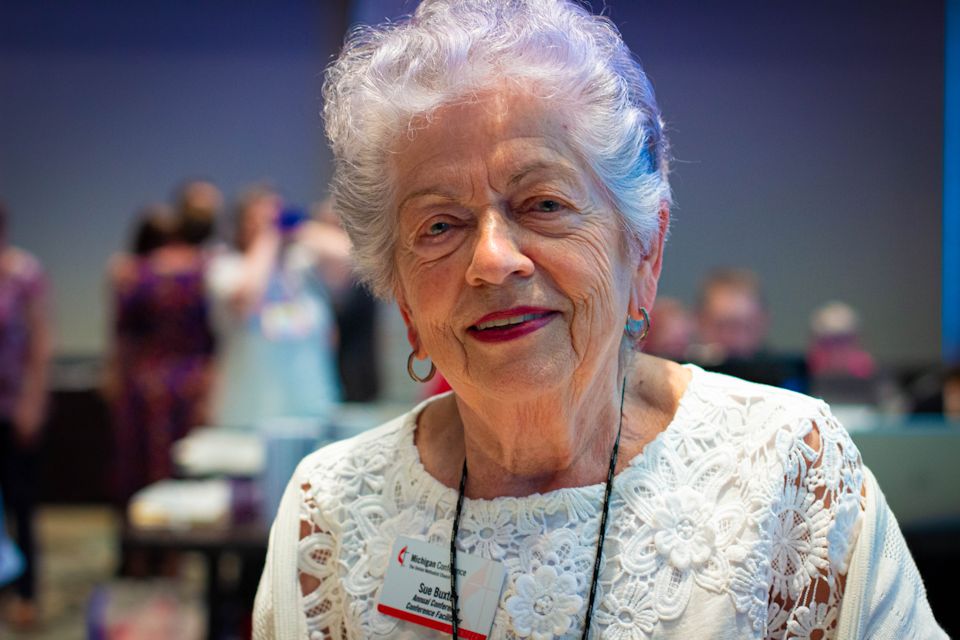
Bishop Bard thanked persons leaving the Cabinet. Elizabeth Hill retires this year. Jeff Maxwell returns to retirement. The Heritage District welcomes LuAnn Rourke, and John Kasper arrived in the Central Bay District on July 1. Jerry DeVine begins service as the new dean of the cabinet.
The bishop also expressed gratitude to Nichea VerVeer Guy for her able leadership of the Commission on the Annual Conference. John Wharton and Anne Soles were praised for their partnership in birthing the new Michigan Conference.
Two cherished events of the annual conference — Celebrating the Journey of Ministry and the Service of Recognition, Commissioning, and Ordination – were not able to be included in the 2020 session. Still, the Clergy Session held on Tuesday, July 28, and voting electronically welcomed 19 persons into conference membership. These included one deacon in full membership and five elders in full membership; one deacon into provisional membership and 12 elders into provisional membership. Clergy Session also celebrated the retirements of 52 clergy.
Click here for more details in, Names and Faces of AC 2020.
Bishop Bard noted, “These are moments when we would stand and applaud. Know friends that we are doing that in our hearts.”
The last official act of the 2020 Virtual Michigan Annual Conference was the fixing of the appointments by Bishop Bard.
The session ended as it began, with seeds. The closing worship video reminded members and viewers: “A sower went out to sow. That sower is us. We are the ones called to scatter seeds.” View the video of closing worship online, Day 2 Afternoon Session, 1:38:09.
Videos of the morning and afternoon plenary sessions and missions benefiting from the Ingathering (HAPI, Bishop Judith Craig Children’s Village, and Michigan Disaster Recovery) are available here.
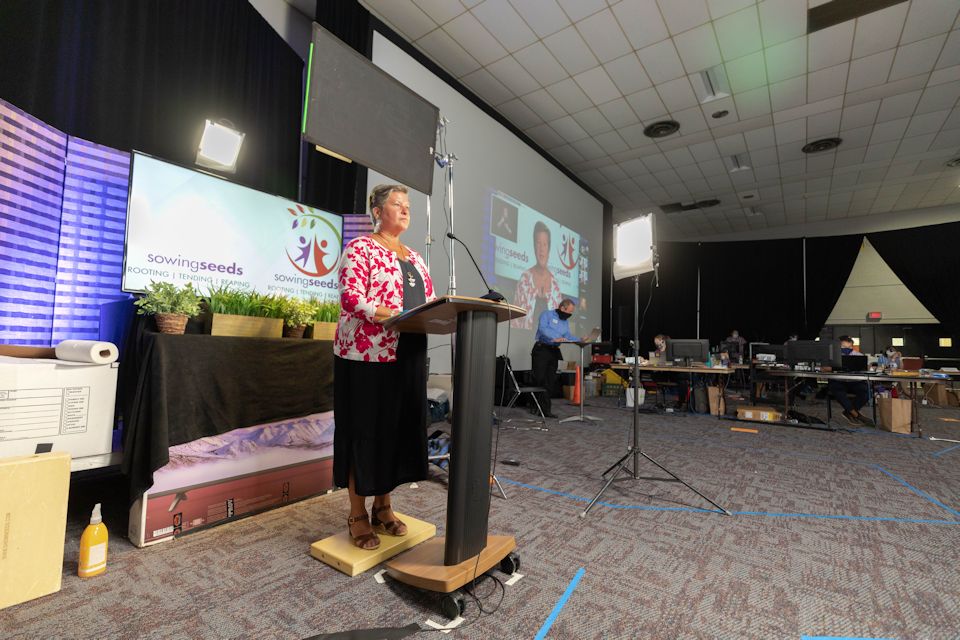
Last Updated on January 10, 2023

